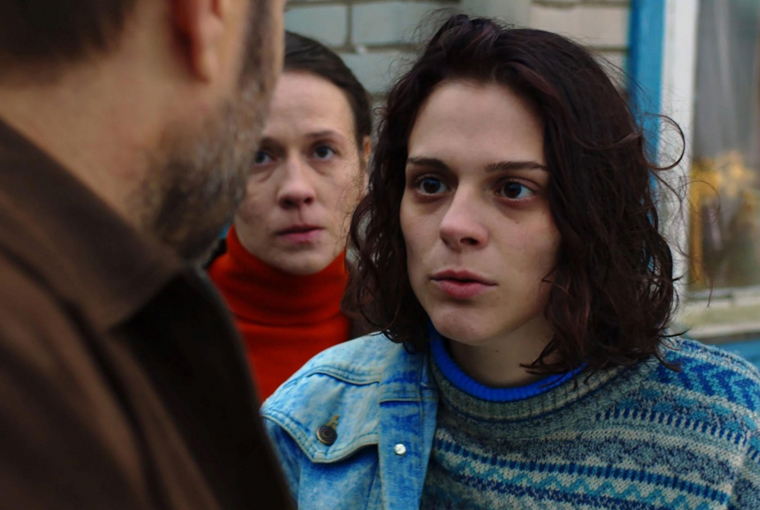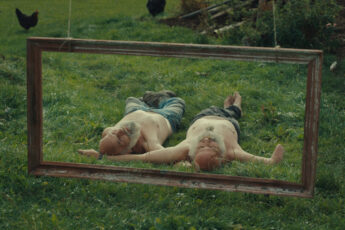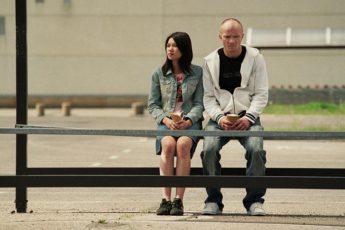Unhappy Families are all Alike
Kantemir Balagov’s Closeness (Tesnota, 2017)
Vol. 80 (December 2017) by Daniil Lebedev
The Russian word tesnota (~tightness, lack of space) denotes a paradox: it describes the inconvenience of being close to something, but this inconvenience is attributed a positive emotion. Thus, in Russian you can say that you are “crowded, but not aggrieved”. You can see the same paradox in another Russian saying: “The bird in the hand is better than the crane in the sky”. How come? Well, at least you have something in your hand. At this point, even a broom would be better than a crane. But when you are cramped, it means that you are in a closed space and that is something. “Ciasne ale własne”, they say in Poland, which means “It is not big, but at least it’s yours”. Home and family are two basic examples of tesnota. Both things represent a hidden need for safety, for “holding on to something”.
Any identity works according to the “law of tightness”. Above all, it does not say what you are, but what you are not. That is why you cannot let identity solve problems of personality or take personality’s place. It is the same as carrying water in a sieve. Identity can’t do that. It is just not what it does. And when it tries, you get something like this: folk dances, painted rags, “honor thy father”, “worship thy mother”, cultural forms long obliterated, mysterious rites with meanings long forgotten, and behind all that, somewhere in the background – a human being. That, among other things, is a theme of Kantemir Balagov’s Tesnota.
We do not know much about Kantemir Balagov because Tesnota, this year’s FIPRESCI award winner, is his first full-length feature film. After studying at the Ministry of Internal Affairs school for 3 years, Balagov found himself in Alexander Sokurov’s workshop, whose personal engagement made the filming of Tesnota possible.
Nalchik, a small city where the movie takes place, is Balagov’s birthplace. It is also the capital of the Kabardino-Balkarian “republic”. According to a 2010 census, 57% of the republic’s population – about 500 thousand people – are Kabardians. They used to be independent, reigning over quite a big part of North Caucasus, called Kabarda. However, their independence was called into question during the reign of Ekaterina II towards the end of the XVIII century and finally lost during the Caucasian wars (1817 – 1864). These events led to an emigration of Kabardians, mainly to Turkey, where there are now over one million.
In modern Russia, Kabardians maintain all symptoms of a minority, speaking Russian as well as Kabardino-Cherkessian. If they do have a home in Russia, then it is Nalchik. In addition, Nalchik has a small Jewish community. The national tension is aggravated by the fact that the film takes place at the end of 90s – between the two Chechen wars. The whole situation is complicated further still by the characteristics of modern Russia – in the backyard of a country whose only reliable social institution is the family, the whole system of social relations takes a tribal turn. That is why a mother in Balagov’s film tells her daughter there is no way she will marry a Kabardian because he “is not from her tribe”. Kabardians lack space in Russia, Jews lack space in Nalchik, but the main lack of space (tesnota) is the one individuals feel as a result of being glued to their Jewish and Kabardian furs.
Tribal structure is built on the law of the strongest, meaning that the weakest takes the hit. In Tesnota, two newlyweds – David and Lea – get kidnapped. A marriage that is meant to reinforce the bond between two Jewish families soon becomes a challenge for the entire community. Ilana, David’s sister and main heroine, tries her best to live in that little gap of social indeterminacy where her freedom and personality reside. She loves her brother and she loves her father, but she also loves Kabardian Zalim. Refusing her inborn belonging, Ilana seeks a different and more personal pathway towards forming her personality: she connects with her father through a common hobby (the garage, where they work together), with her brother through confidentiality and friendship, and with Zalim through love.
The forbidden love between Ilana and Zalim replays the old Romeo and Juliette story – a story of identity’s claims on personality. If I am a Montague and you are a Montague, together we are Montagues – it’s all clear and well. But if I am a Montague and you are a Capulet and we start thinking about “us”, then we are just people. Here, broadly speaking, is the difference between personality and identity, between being close and being cramped. Unfortunately, Ilana’s personal world breaks down. Her brother gets kidnapped, her father has to sell his garage and only the forbidden love to the “stranger” is left, though her own “tribe” tries to redeem it from Ilana – neighbors offer money to free her brother on the condition that she will marry their son. Exploitation of personal grief for the common good is the leitmotif of Ilana’s relationship with her family. This takes us back to the roots of the connection between identity and violence.
Balagov tells us how Sokurov has promised to get him directly into the third year of his school on the condition of Kantemir “not filming violence anymore”. Kantemir agreed only to break his promise in his very first movie. The atmosphere of continuous inner tension of the “never ending war” period that has led to the increased impenetrability of national communities is reflected in domestic and war scenes. Sex between Ilana and Zalim in some kind of store room grows into a fight bordering on rape. One of the most unforgettable scenes of the film is the one where Ilana is accompanied by Zalim and his Kabardian friends, who watch snuff-videos of Russian soldiers getting tortured and decapitated by Chechen militants. This scene gets mirrored at the end of the movie when the mother’s hug turns into a chokehold. Love mimics the surrounding world of restriction.


Torture of a Russian soldier and Illana with her mother in Tesnota
Any group, built on the principal of tesnota, on common grief, has to turn this grief on the outside world. Misery accumulated inside becomes a rejection of what is happening outside. That is how communities based on fear appear. That is also how chickens gather up when they hear steps outside the coop. Tesnota is a symbol of violence. Like fingers clenched together to make a fist.
There are two directions colliding in the movie. On the one hand, Ilana’s family tries to retain her in their own lack of space. On the other hand, Ilana herself is moving in the other direction – she tries to break the borders, to go down the route of love with Zalim (whose “fellow tribesmen” kidnapped her brother), thus refusing to merge personalities – hers and Zalim’s – with identities.
The movie is built on this initial refuse. It starts with the director’s statement: “My name is Kantemir Balagov. I am Kabardian”. But the movie tells the story from a Jewish perspective. Doing that, Balagov sets the tone by bringing together two identitarian discourses – Jewish and Kabardian. The accent shifts from the fight between two identities to the conflict in the core of the term identity itself. In Balagov’s vision, contrary to Tolstoy’s, unhappy families are all alike.
As the movie progresses, a growing number of identity barriers arise. Her parents don’t want to hear about Ilana’s feelings and tell her about “Jewish marriage”; her brother, freed from captivity by personal sacrifices of his family members, moves to the other home. Finally, Ilana understands that Zalim is not ready to welcome her into his house because it’s a Kabardian one. This final realization is the hardest one.
Here we have a Romeo and Juliette story in which Romeo does not have the nerves to forfeit the Montagues’ name for his love. Here we have – in Ilana – Ivanov’s wife, only that she, being Sarra Abramson still, realizes that finally he wasn’t worth her sacrifice and that he wouldn’t leave his family to marry her. Balagov has told “Esquire” that in his movie he shows why “in a sense, Jewish women are much stronger then Caucasian men.” That caused Caucasian men to lash out at Balagov on Facebook.




Leave a Comment